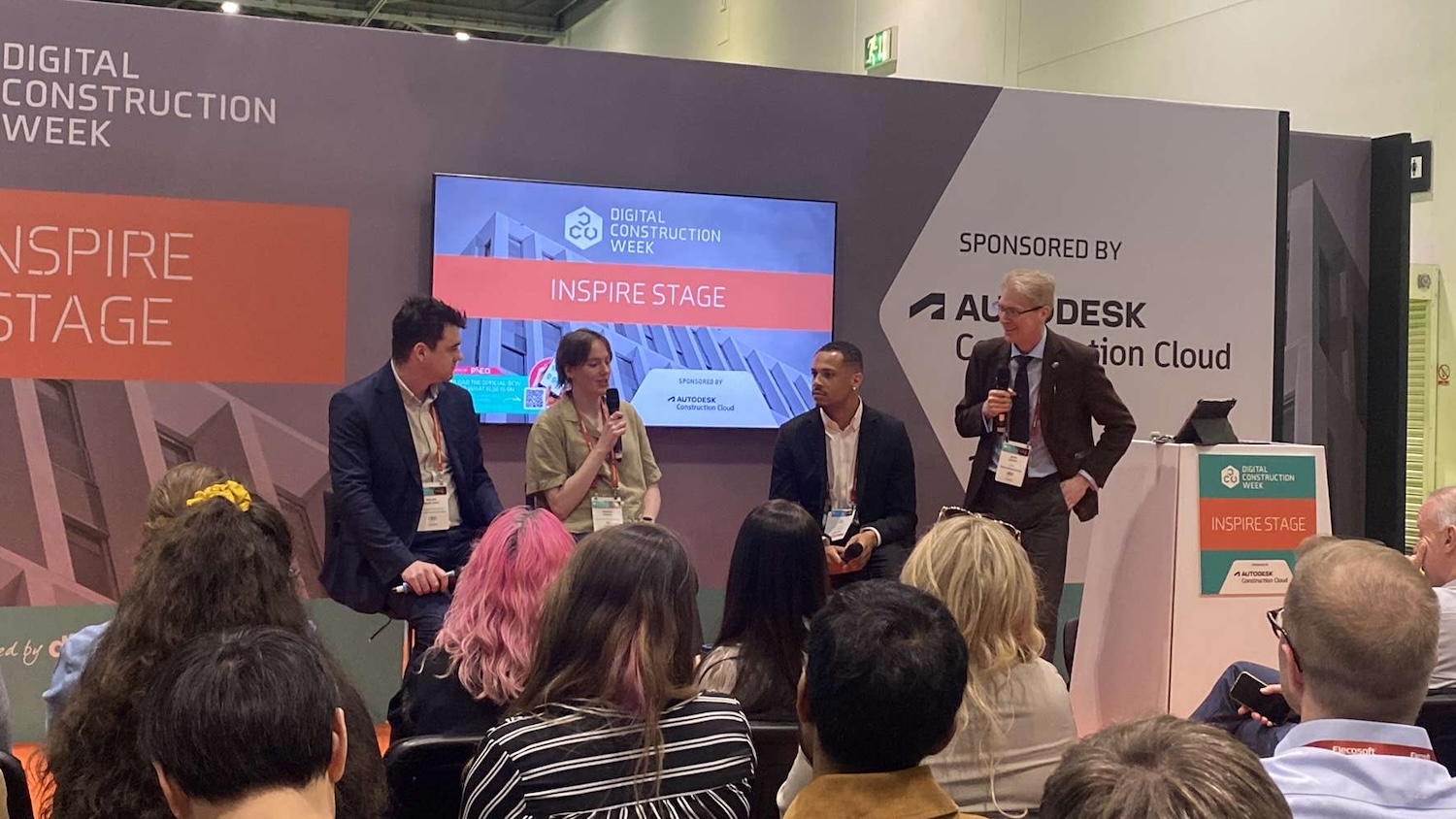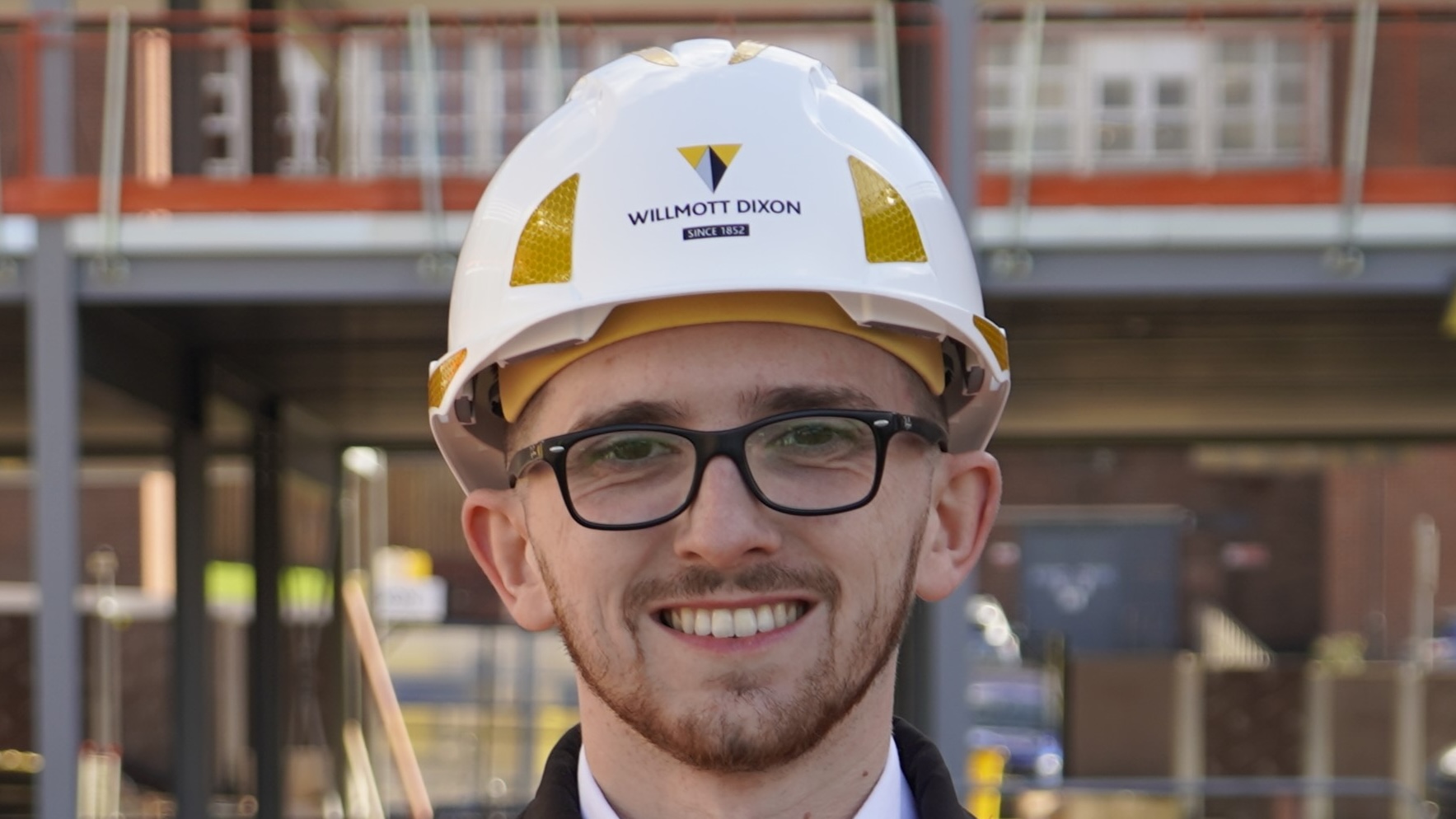
Next gen thinking: the future speaks
How will the next generation of digital construction professionals address the industry’s challenges? DC+ hosted a panel discussion at Digital Construction Week to find out.

The future is in the hands of the next generation of digital construction professionals. To find out what they’re thinking, we got three of them together on stage at Digital Construction Week. The trio were:
- Ben Hardie, digital engineer at Laing O’Rourke;
- Isabelle Barron, digital construction consultant at WSP; and
- William Baker-Jones, digital construction lead at Kier Natural Resources, Nuclear & Networks.
Hardie was named Digital Rising Star of the Year at last year’s Digital Construction Awards. He joined Laing O’Rourke straight from sixth form as part of the contractor’s school and college leaver programme, where he went on to study for his degree. As he progressed his career in the company, he transitioned to digital engineering, which is where he found his passion. He was admitted to Laing O’Rourke’s digital engineering buddy scheme as a mentor. He has lectured to students and represented the industry at STEM events and careers fairs.
Barron is shortlisted for Digital Rising Star at this year’s Digital Construction Awards. She joined WSP in January 2024 and quickly proved herself to be an invaluable asset. She has been instrumental in implementing innovative digital solutions across various projects, showcasing her ambition and commitment to information management best practices and demonstrating exceptional proficiency in leveraging digital technology to enhance project outcomes and organisational success.
Barron has also represented the UK at WorldSkills, the craft skills Olympics. She achieved a gold medal for digital construction in EuroSkills 2023, and the Best in the Nation award and a medallion for excellence at WorldSkills 2024.
Baker-Jones returned to Kier earlier this year as digital construction lead at Kier Natural Resources, Nuclear & Networks. He is responsible for ensuring consistency of digital delivery across the division’s projects and will lead the recertification of the division’s BSI Kitemark. He worked at Babcock International for the previous four years, where he rose from project BIM lead/principal BIM and digital engineer to deputy head of BIM and digital engineering. His first stint at Kier started in 2018 as BIM coordinator; he rose to senior BIM coordinator before joining Babcock in 2021. He has been involved in nima, GIIG and buildingSmart UK & Ireland.
DC+: How has the sector progressed in your time in it?
Baker-Jones: I think it has progressed and, in some cases, regressed – we’re still seeing Excel spreadsheets and pdfs being sent round in emails. But we are starting to move towards a more digital approach. As the older generation are starting to move on, we need more of the younger generation [to join the sector].
Barron: The main change I’ve seen is people’s willingness to adopt digital practices and tools. I’m part of the WSP Professional Growth Network [a voluntary group of early career professionals who aim to connect, develop, and provide a voice for others across the business – ed] and I’ve presented a lot of talks about my team and what we do. There’s a lot more interest since I first started: people want to understand what we do and how to adopt those technologies.
Hardie: Things have definitely progressed in my seven years. Not only have the tools got better, but also the adoption. There’s more integration of technology into project delivery. When I started, you could still see engineers on site with paper drawings, printing out pdfs. Now, on site – particularly a Laing O’Rourke site – you’re seeing engineers using tablets to access information.
What are the sector’s key challenges and how can they be addressed?
Barron: The main challenge that I think needs to be addressed is how we’re going to get young people into this industry. I think you would be hard pressed to go into a school and talk to a year 10 person or a college student, and they would know what digital construction is.
It’s one of those subjects that you may not discover in this country until further education. During my degree, I was taught a bit of a regular module about BIM and I wrote an essay about it.
We definitely need to make [digital construction] known, go out into education and let people know that this career exists and what career options could be out there for them, instead of professionals having to wait five or 10 years into their career before they realise it exists.
Baker-Jones: I’ve got a personal example of that. I’ve got some brothers-in-law who are 15 and 16 years old. They’re playing Roblox constantly. I look at what they’re doing in that game: they’re prime candidates for digital construction.
It’s about targeting those children who are just enjoying Roblox or Minecraft, and exposing that career opportunity. But there’s that stigma around construction that you’re in a muddy field with a spade, but it’s far from that.
Hardie: Digital literacy is one of the biggest issues. We’re pushing forward in terms of innovation, but we run the risk of leaving a large portion of the workforce behind by not bringing up that baseline skill level.
The solution is, simply, training. The training needs to be easily accessible, frequent and easy to digest.
In the future, when you’re in a leadership position, is there anything that you will do differently to those who have come before you?
Baker-Jones: Stop buying technology. Companies are constantly buying technology and thinking it’s going to save the world. I’ve seen 60-year-old project managers using Excel in quite advanced ways, but show them some of the database solutions [on display at DCW] and they’re lost. Less is more.
Hardie: Standardisation. I work a lot with data on my projects, and one of the most frustrating things is the fact that when you receive that data, it’s never exactly the same.
Starting from the beginning, we need consistency – and not just project-to-project within the same business, but industry-wide. I think that comes from collaboration and being open about the solutions that we have. Some people might look at that as giving away their trade secrets, but it’s collaborating to improve industry standards and the way we work. That’s the big goal.
Barron: My answer is less tangible. We’ve had so much rapid change just in my time in the industry, and I think that rate of change will only accelerate further. So, as a manager in the future, you will need to prepare to be unprepared: keep an open mind about whatever’s coming next.
What more can we do to attract skilled people from other industries?
Baker-Jones: Pay better salaries! You look at the financial sector and you’ve got graduates who are earning insane amounts of money, but they’ve got that digital literacy and the skills [that could transfer to digital construction]. If we pay more, we’ll attract more talent.
Barron: Focus on the soft skills that people have, those transferable skills. There are so many tools and technologies that we expect people to learn, and it can be quite overwhelming for someone new to the industry to know what to focus on. So focusing on the things that they can do, [and allowing them] to pick up later on [the other elements] will definitely help to push people across.
Hardie: I agree. We have to make the industry more enticing, not just with better pay, but with the benefits as well.
Keep up to date with DC+: sign up for the midweek newsletter.



